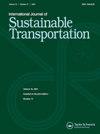Road safety of micro-mobility and vulnerable road users: Insights and issues from a world café
IF 3.9
3区 工程技术
Q2 ENVIRONMENTAL STUDIES
International Journal of Sustainable Transportation
Pub Date : 2025-07-03
DOI:10.1080/15568318.2025.2522370
引用次数: 0
Abstract
Road traffic incidents are responsible for the loss of ∼1.19 million lives annually and the 50 million people who sustain injuries. Vulnerable Road Users (VRUs) account for a significant portion of these data, constituting 70% in Europe and 50% in the United Kingdom (UK). Addressing these alarming fatality rates requires initiatives such as the European Union’s Vision Zero, which aims at eradicating road collision fatalities and serving as a model for global action. Similarly, the UK is committed to realizing its transport vision 2050, emphasizing seamless, safe, net-zero, interconnected, cost-effective, accessible, and dependable transportation for all. Effective implementation of appropriate safety interventions hinges on understanding the challenges VRUs face. While previous studies have delved into challenges encountered by specific VRU groups, this research fills a gap by comprehensively examining difficulties encountered by various VRUs. Therefore, this study aims to adopt a co-creation process to expose insights and issues shared by VRUs across Oxfordshire, UK, and to identify collective solutions that could improve road safety. The study adopted a world café method, which fosters an environment where diverse perspectives and ideas are explored through open-ended conversations. Thematic analysis of the qualitative data identified critical areas for intervention: infrastructure, behavior, technology, environment, law enforcement, and awareness. Apart from the interventions, the research underscores the need for end-user involvement in mobility infrastructure planning, as safety requirements vary among VRU categories, emphasizing the urgency of adopting a human-centric design approach to reduce road injuries and fatalities and ensure equal accessibility and safety for all.
微型机动车辆和弱势道路使用者的道路安全:来自世界咖啡馆的见解和问题
道路交通事故每年造成约119万人死亡,5000万人受伤。弱势道路使用者(vru)占这些数据的很大一部分,在欧洲占70%,在英国占50%。要解决这些令人震惊的死亡率问题,需要采取诸如欧洲联盟“零愿景”等举措,该愿景旨在消除道路碰撞死亡,并成为全球行动的典范。同样,英国也致力于实现其2050年交通愿景,强调为所有人提供无缝、安全、净零、互联、经济高效、便捷和可靠的交通。有效实施适当的安全干预措施取决于了解vru面临的挑战。以往的研究主要针对特定VRU群体所面临的挑战,而本研究通过全面考察不同VRU所面临的困难,填补了这一空白。因此,本研究旨在采用共同创造的过程来揭示英国牛津郡vru共享的见解和问题,并确定可以改善道路安全的集体解决方案。这项研究采用了一种世界咖啡馆的方法,这种方法营造了一种通过开放式对话探索不同观点和想法的环境。定性数据的专题分析确定了干预的关键领域:基础设施、行为、技术、环境、执法和意识。除了干预措施外,该研究还强调了终端用户参与移动基础设施规划的必要性,因为不同VRU类别的安全要求各不相同,强调了采用以人为本的设计方法以减少道路伤害和死亡,并确保所有人的平等可达性和安全性的紧迫性。
本文章由计算机程序翻译,如有差异,请以英文原文为准。
求助全文
约1分钟内获得全文
求助全文
来源期刊
CiteScore
8.90
自引率
2.60%
发文量
56
期刊介绍:
The International Journal of Sustainable Transportation provides a discussion forum for the exchange of new and innovative ideas on sustainable transportation research in the context of environmental, economical, social, and engineering aspects, as well as current and future interactions of transportation systems and other urban subsystems. The scope includes the examination of overall sustainability of any transportation system, including its infrastructure, vehicle, operation, and maintenance; the integration of social science disciplines, engineering, and information technology with transportation; the understanding of the comparative aspects of different transportation systems from a global perspective; qualitative and quantitative transportation studies; and case studies, surveys, and expository papers in an international or local context. Equal emphasis is placed on the problems of sustainable transportation that are associated with passenger and freight transportation modes in both industrialized and non-industrialized areas. All submitted manuscripts are subject to initial evaluation by the Editors and, if found suitable for further consideration, to peer review by independent, anonymous expert reviewers. All peer review is single-blind. Submissions are made online via ScholarOne Manuscripts.

 求助内容:
求助内容: 应助结果提醒方式:
应助结果提醒方式:


